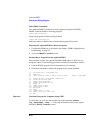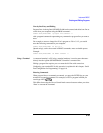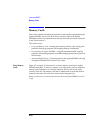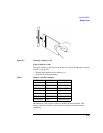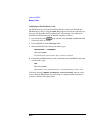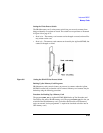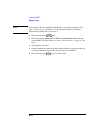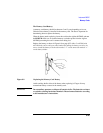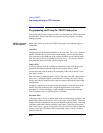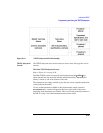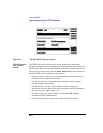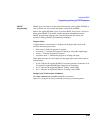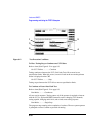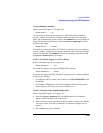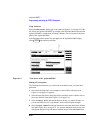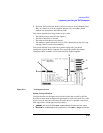
8-26
Instrument BASIC
Programming and Using the TESTS Subsystem
Programming and Using the TESTS Subsystem
This section describes the concepts and tasks associated with the TESTS subsystem.
It is intended to help the experienced programmer develop programs, or modify
existing programs.
TESTS Subsystem
File Descriptions
Three types of files are used in the TESTS subsystem to store different types of
information.
Code Files
The first aspect of an automated definition is the code itself. This is just a standard
IBASIC Code file that can reside either on the Memory card, on an external disk
drive connected to the GPIB port of the Agilent 8922M/S, or in an internal RAM
disk. The name of this file is preceded by a lower case ‘c’. This tells the TESTS
subsystem that this particular file contains program code.
Library Files
A Library indicates all of the available test subroutines in the code, the set of all
parameters that might be entered using the user-interface screens, and all
specifications that might be used by the subroutines in the code to decide if a test
point passes or fails.
Only one Library is defined for each Code file. The name of this file is preceded by a
lower case ‘l’, telling the TESTS system that this is a Library file. Also, both the
Library and Code file should have the same base name to indicate the relationship
between them.
A Library is required if you want to use the user-interface screen functions of the
TESTS subsystem. If the program is simple enough that there is no need for
user-input, or if all the user-input is simple enough to be accomplished through
INPUT statements, then a [NO LIB] option is available.
Procedure Files
A Procedure allows the user to define which of the test subroutines, parameters, and
specifications defined in the Library will be used to test a specific Radio. There may
be many Procedures defined that use the same IBASIC Code and Library, each using
a different subset of the choices available in the Library. These files are preceded
with a lower case ‘p’, but are not required to have the same base name as either the
Library or the Code. The name of the corresponding Library (if any) is stored in
each Procedure file.



